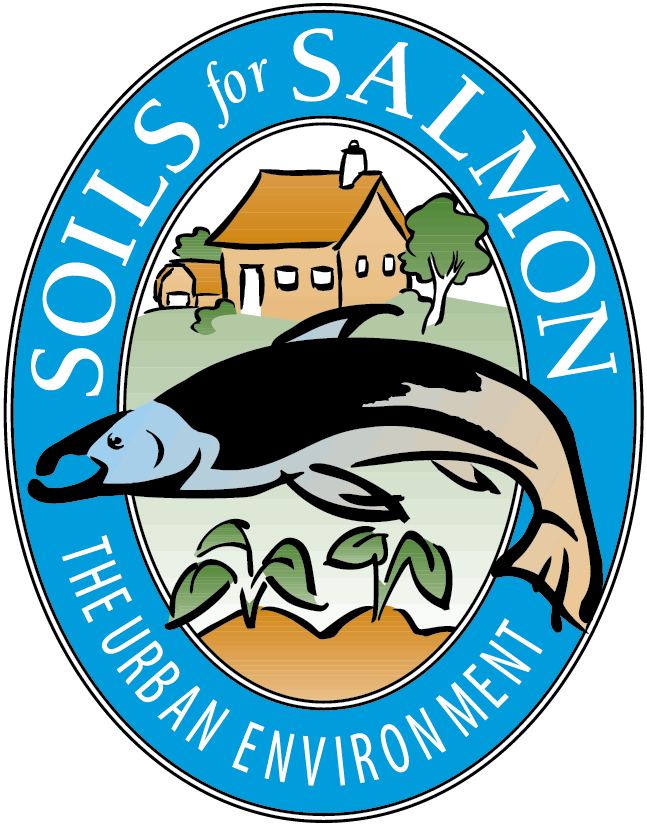Why Build Healthy Soil?
Healthy soil protects our waterways for salmon, orcas, and people. Soil performs valuable functions: nourishing plants, absorbing, filtering and cleaning stormwater runoff. These functions are often degraded during development when vegetation and soil are removed or compacted. Restoring healthy soil is essential to protecting our waterways, salmon, orcas and other wildlife, and our way of life in the Puget Sound region.
On this page: The Soil-Water-Salmon-Orca Connection, How Compost and Other Organic Amendments Restore Soil Functions, and the Benefits of Soil Best Practices for Builders, Property Owners, and Our Waterways
The Soil-Water-Salmon-Orca Connection
In native forests around Puget Sound, soil and plants absorb most rainfall and minimize stormwater runoff. 50% of the rain that falls returns to the sky as "evapo-transpiration" (as tree roots pull water from the soil and it evaporates from leaves and needles). Almost all the rest filters slowly into and through the soil, to feed streams year ’round. But typical development practices remove forests and topsoil, degrading the land's ability to hold and recycle rainwater. After typical development, only 15-30% of rain evaporates, while most rushes swiftly off roofs, roads, and compacted soil (known as "impervious surfaces"). This erodes streams, causes flooding, and carries pollution and sediment, damaging essential habitat for salmon and other aquatic life, and the orca whales that feed on them.
Native Soil - rain soaks in
After Development - rain rushes off
Native soils and forests are disappearing rapidly in the Puget Sound region. Conventional development practice has been to strip topsoil during grading, compact the whole site with heavy equipment during construction, and replace only 1-2 inches of soil over the compacted subsoil before landscaping.
The impacts on salmon, orcas, water quality, and streams are well-documented. Not only are winter peak storm flows much higher, but summer stream flows are much lower because groundwater is not being recharged. Increased runoff from roads, buildings and landscapes carries oil, grease, metals, pesticides and other pollutants into our waterways and into Puget Sound. Scientists at the University of Washington and elsewhere have documented significant loss of stream health with the first 5-10% of impervious area constructed in watersheds under conventional development practices.
Salmon in the City (PDF) Scientific papers presented at this 1998 conference highlighted the need to change development practices, especially to restore soil hydrology functions on every site. That research led to soil restoration requirements in the Washington State Stormwater Manual. Washington’s 2019 Orca Recovery Task Force recommends reducing polluted runoff to restore our salmon and the orca whales that depend on them. Washington’s Stormwater regulations (PDF) now require restoring construction-impacted soils by amending with compost.
UW Stormwater Trials - till soil, no compost
Glacial till soil typical in developing areas. High runoff, more pollution, and poor turf quality.
With Compost - less runoff, better turf
Same soil with 30% compost added. Up to 50% less runoff, and turf is still healthier 4 years later.
How Compost and Other Organic Amendments Restore Soil Functions
Soil functions are created by soil life. The billions of organisms in the soil are fueled by soil organic matter. They create soil structure and pore spaces, which provide stormwater infiltration, drainage, and moisture-holding capacity. They also create soil fertility and resistance to erosion, protect plants against diseases, and break down urban pollutants like oil, grease, metals, fertilizers, and pesticides.
Soil Biology Primer (on USDA Natural Resources Conservation Service website) illustrates how the soil ecosystem creates these essential functions, in agriculture, forest, and urban landscapes.
Soils for Salmon: Integrating Stormwater, Water Supply, and Solid Waste Issues in New Development and Existing Landscapes (PDF) reviews the science behind soil restoration, and opportunities to change soil practices in this region. The Relationship Between Soil and Water: How Soil Amendments and Compost Can Aid in Salmon Recovery (PDF) illustrates the need for soil "Best Management Practices", and describes the Soils for Salmon initiative of the Washington Organic Recycling Council .
Compost amendment restarts the soil ecosystem – restoring functions in soils disturbed during development. Tilling in compost immediately reduces soil compaction and increases stormwater infiltration rates. The compost feeds and creates habitat for beneficial soil organisms – restoring the ecosystem in degraded soils, so they begin to function again more like native soils.
Protecting native soil, and restoring disturbed soils with compost, is essential to restoring salmon and the health of our waterways in the Puget Sound region. Soil restoration is the foundation of the Low Impact Development (LID) practices being adopted around Puget Sound to cost-effectively manage polluted stormwater runoff and restore the health of our waterways for salmon, orcas, and people.
Benefits of Soil Best Practices
For Builders, Developers, and Landscape Contractors
Better landscape appearance = happier customers, which sells the next job
Better erosion control
Better stormwater management, cleaner water
Easier, faster planting in amended soil
Much better plant survival (fewer callbacks for dying plants and lawns)
For Property Owners
Easier, cheaper landscape maintenance
Up to 50% less summer irrigation needs
Lower fertilizer needs
Much less pesticides and herbicides needed – easier, and healthier for families
Better landscape appearance, all year ’round
For Our Waterways, Salmon, Orcas, and Other Wildlife
Reduced stormwater runoff = less erosion and sediment in salmon streams
Increased groundwater recharge = better summer stream flows
Less demand for irrigation water supply = more water in rivers for wildlife
Making and using compost moves carbon from the air into the soil, protecting our climate
Bio-filtration of urban pollutants – soil removes chemicals that threaten children, salmon, and orcas
Less need for fertilizers and pesticides, so less washing off into streams


